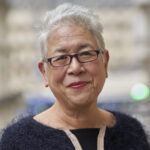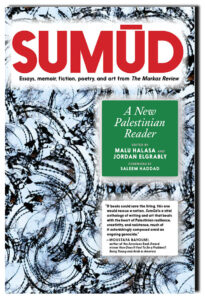
- This event has passed.
U.S. Book Tour: “Sumūd: A New Palestinian Reader” with editors Malu Halasa, Jordan Elgrably & Special Guests

- Jan. 24, 7 pm (Fri) Politics and Prose, 5015 Connecticut Avenue NW, Washington, D.C. 20008
- Jan. 30, 5:15 pm (Thurs) Harvard, Harvard Divinity School, 45 Francis Ave, Cambridge, MA, 02138 RSVP Online
- Jan 31, 5:30 pm (Fri) University of Pennsylvania, 3451 Walnut St, Philadelphia, PA 19104 (special guest Ahmad Almallah) More info
- Feb. 5, 5-7 pm (Wed) NYU, Arthur L. Carter Journalism Institute, 20 Cooper Square NYC 10003 (special guest Mosab Abu Toha & Lina Mounzer ) RSVP Online
Donations are welcome to support The Markaz Review.
_____________________________________________________________________________________________________
An anthology that celebrates the power of culture in Palestinian resistance, with selections of memoir, short stories, essays, book reviews, personal narrative, poetry, and art.
Includes twenty-five black-and-white illustrations by Palestinian artists.
The Arabic word sumūd is often loosely translated as “steadfastness” or “standing fast.” It is, above all, a Palestinian cultural value of everyday perseverance in the face of Israeli occupation. Sumūd is both a personal and collective commitment; people determine their own lives, despite the environment of constant oppressions imposed upon them.
In times of devastation, poetry, literature, and art are the mediums through which oppressed peoples reveal cherished aspects of their existences and remain defiant in the fight for self-determination. Sumūd: A New Palestinian Reader honors the Palestinian spirit and its power in the face of dispossession and war. When governments around the world enable the genocide of a people and the dilapidation of a sacred homeland, the Palestinian people stand fast and resist. The fifty-eight contributions in this collection remind readers that just as love perseveres, so do the Palestinians, and their struggles and triumphs.
The essays, stories, poetry, art and personal narrative collected in Sumūd: A New Palestinian Reader is a rich riposte to those who would denigrate Palestinians’ aspirations for a homeland. It also serves as a timely reminder of culture’s power and importance during occupation and war.
_____________________________________________________________________________________________________
About the editors:


JORDAN ELGRABLY is a Franco-American and Moroccan writer and translator, whose stories and creative nonfiction have appeared in numerous anthologies and reviews, including Apulée, Salmagundi, and The Paris Review. Editor-in-chief and founder of The Markaz Review, he is the cofounder and former director of the Levantine Cultural Center/The Markaz in Los Angeles (2001–2020). He is the editor of Stories from the Center of the World: New Middle East Fiction (City Lights 2024) and co-editor with Malu Halasa of Sumūd: a New Palestinian Reader (Seven Stories Press 2024). Based in Montpellier, France and California.



